Share
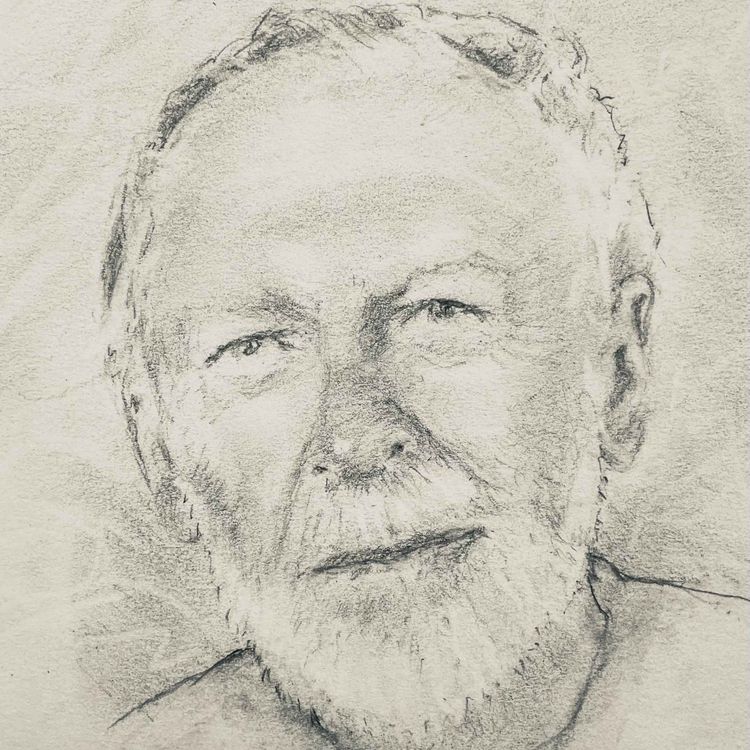
BRAINLAND
A MATTER OF LIFE AND DEATH: The story of a movie.
'A Matter of Life and Death' (AMOLAD) is a 1946 film by Michael Powell and Emerich Pressberger. Peter Carter, a bomber pilot is returning from the last raid of the war. His plane and parachute are shot up so he decides to 'jump rather than fry' and has a last conversation over the radio with June, an American radio operator before jumping, as he expects, to his death. He doesn't die but washes up on a beach and as a love story unfolds between him and June he is menaced by recurrent episodes (clinically, complex partial epileptic seizures though the words aren't mentioned in the film) during which a 'conductor' from the afterlife tries to persuade him to return with him as he shouldn't really have survived. The film culminates in a realistically staged neurosurgical operation on Peter whilst in the afterlife his case to go on living is put on trial trial. Ian explains why this is his favourite film of all time (as it is Ken's),their conversation ranging over origin and influences, forebears and progeny, design and music, the clincial neuroscience that underpins it and much more.
Participants:
Ian Christie, Professor of Film and Media History, Birckbeck, University of London. www.ianchristie.org
Ken Barrett, artist and writer, retired neuropsychiatrist http://www.kenbarrettstudio.co.uk/
For more about 'A Matter of Life and Death'https://www.imdb.com/title/tt0038733/ (SEE IT!)
https://www.bfi.org.uk/film/b58b75d7-e9e2-5a1f-a448-afa92a35462d/a-matter-of-life-and-death
In the UK it is currently (on 21.6.24) On BBC Iplayer.
Ian's book: https://www.amazon.co.uk/Matter-Life-Death-Film-Classics/dp/1839023899
The other book mentioned, on the neuroscientific background of the film, is by Diane Broadbent Friedman: K4rfe3RUVnVfT9z9-aIffzEet5ZKUBDQFbGEV1HSo4yU3JpZWvHWWe5uGzjy5AUH9iAiT5oKdx7a4wWP-x7lubaTLPDggjtJ2wGe_Lz08kwaBYDzg2E6_aKIPxfYYVvKk2vtaR4ghzBqTRUdFZ8-kE.RnIRY1ho2lgxZvWxZW4th9yrxYt89JrWLPj42mXYmKg&dib_tag=se&keywords=friedman.+a+matter+of+life+and+death&qid
This is the the book by Frigyes Karinthy which was part of the inspiration: https://books.google.co.uk/books/about/A_Journey_Round_My_Skull.html?id=trCxtdw5OHcC&redir_esc=y
Opening music, extract from the prelude to Brainland by Stephen Brown.
Brainland the opera website: www.brainlandtheopera.co.uk
Sketch by KB.
More episodes
View all episodes
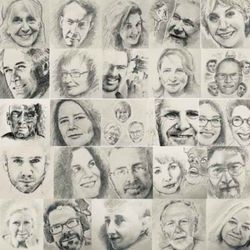
40. SEASON 2 FINALE: Surfing Brainland
30:33||Season 2, Ep. 40The final episode of season 2 is a compilation of 10 male and 10 female voices from season two, chosen more or less at random, about 90 seconds from each episode sampled at or around 20 minutes in. Thanks to all guests for a fascinating season and see you in season 3. The key to the episodes and timings is below:1.10. Kimberly Campanello.(26) DANTE, DOPAMINE AND ME: Neuro-poetic and other explorations into language.2.36. Mark Solms. (29) '...PERCHANCE TO DREAM: On the neuroscience of sleep and dreaming...4.12. Raquel Medina. (2) I FEEL I AM NOT IN MY PERFECT MIND: Alzheimer's and cognitive decline in movies.5.45. Antony Penrose. (31) DREAM WARRIORS: Exploring the world of the surrealists...7.40. Eileen Joyce and Sheldon Benjamin (10) NEUROPSYCHIATRY: Second Coming or Unholy Alliance?9.15. Erika Dyck (13) EXPANDING MINDSCAPES: A psychedelic world tour.10.40. Owen Flanagan (8) WHAT IS IT LIKE TO BE AN ADDICT? A philosopher tells it like it is.12.33. Fiona Sampson. (39) FRANKENSTEIN DISASSEMBLED: The remarkable life of Mary Shelley.13.43. Nick Lane. (3) EVOLUTIONARY BIOCHEMISTRY: New perspectives on the chemistry of you.15.20. Joanna Kempner (11) PSYCHEDELIC OUTLAWS16.16. Jon Stock (35) WILLIAM SARGANT AND HIS 'SLEEP ROOM': Shrinks, spooks and medical hubris.17.56 Julia Vassilieva (38) DISCOVERING EISENSTEIN: Part 2 - Neuroscientific collaborations.19.24. Jonathan Dove (21) OH FOR THE WINGS OF A DOVE: From choirboy to Operatic Maestro.20.57. Tricia Durdey. (7) UPSIDE DOWN IN A HOOP: Processing change through writing, dance and circus skills22.25. Eugen Wassiliwitzky (9) POETRY AND THE NEUROAESTHETICS OF SURVIVAL.23.33. Pia Tikka. (19) NEUROCINEMATIC EXPLORATIONS: Cinema creators in the act of creation.25.20 Frank Burke (30) DREAMWORKS: Fellini's dream obsession, from graphic diaries to movies.26.26. Emily MacGregor (18) WHILE THE MUSIC LASTS: Life, loss and musicology. 28.28. Austin Lim (32) HORROR ON THE BRAIN: The neuroscience behind sci fi and horror.Host: Ken Barrett, visual artist, writer and retired neuropsychiatrist: http://www.kenbarrettstudio.co.ukOpening music: Prelude to the opera Brainland, composed by Stephen Brown. Brainland the opera website: www.brainlandtheopera.co.ukPortrait sketches by KB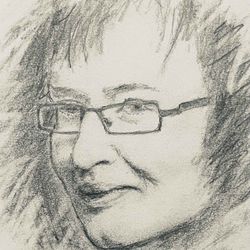
39. FRANKENSTEIN DISASSEMBLED: The remarkable life of Mary Shelley.
01:08:15||Season 2, Ep. 39Fiona Sampson's probing biography of Mary Shelley is the first of a trilogy of biographies of 19th century writers of the romantic period. After sharing her approach to biography, Fiona talks about Mary's famous parents: Mary Wollstonecraft, influential philosopher and educator, who died of puerpural fever shortly after Mary's birth, and William Godwin and radical philosopher. We discuss the intellectual household in which she became a precociously intelligent child, her reading that included key 'natural philosophers, of the day, two long childhood trips that found their way into 'Frankenstein', her elopement at 16 with philandering poet Shelley, the ever-present step-sister, and their subsequent travels. These included the fateful stay in Geneva where Byron had taken a villa and the idea of writing horror stories arose. The book was completed when she was only 18 and we explore the various themes and interpretations of the novel, an immediate best-seller with several early stage versions. We talk about her bereavments (3 of 4 children and Shelley, in 1822), her challenging life post-Shelley, and her other novels, including the less known but equally genre-creating 'The Last Man'. To conclude, Fiona reads a summing up section from the end of her book. A terrific in depth conversation about an extraordinary woman.Participants:Fiona Sampson, poet, biographer, Professor Emerita, University of Roehampton; Senior Research Fellow, Harris Manchester College University of Oxford. https://www.fionasampson.co.uk/Ken Barrett, visual artist, writer and retired neuropsychiatrist: http://www.kenbarrettstudio.co.ukFiona's biography 'In search of Mary Shelley': https://www.fionasampson.co.uk/book/in-search-of-mary-shelley-the-girl-who-wrote-frankenstein/Mary Shelley's 'Frankenstein; or the Modern Prometheus' (1818): https://en.wikipedia.org/wiki/FrankensteinMary Shelley's 'The Last Man' (1826): https://en.wikipedia.org/wiki/The_Last_ManOpening and closing music: Prelude to the opera Brainland, composed by Stephen Brown. Brainland the opera website: www.brainlandtheopera.co.ukPortrait sketch by KB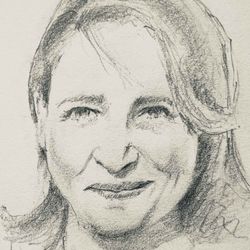
38. DISCOVERING EISENSTEIN: Part 2 - Neuroscientific collaborations.
48:15||Season 2, Ep. 38Soviet era film director and theorist Sergei Eisenstein began collaborating with Alexander Luria and Lev Vigotsky, key figures in neuropsychology and developmental psychology, in 1925, the year he released his most famous film, Battleship Potemkin. Julia Vassilieva, after studying psychology in Moscow, got the opportunity to study the papers of Luria and Vigotsky, both of whom had a long term collaboration with Eisenstein. We talk about them, their work, Eisenstein's involvement in their research and what he took from them. Julia outlines the perilous times they lived in, Luria means of surviving the various purges and how out of favour Vigotsky was perhaps spared execution by dying of TB in 1934. We talk about what Eisenstein regarded as his life's work, the still largely untranslated 'Method' uncompleted when he died in 1948 and future directions for Eisenstein research. Another great transdisciplinary Brainland conversation.Participants:Julia Vassileva, Senior Lecturer in Film and Screen Studies at Monash University, Melbourne, Australia. https://research.monash.edu/en/persons/julia-vassilieva/Ian Christie, Professor of Film and Media History, Birkbeck, University of London. www.ianchristie.orgKen Barrett, visual artist, writer and retired neuropsychiatrist: http://www.kenbarrettstudio.co.ukPapers by Julia: EISENSTEIN AND CULTURAL-HISTORICAL THEORY, 2017, The Flying Carpet. Studies on Eisenstein and Russian Cinema in Honor of Naum Kleimanhttps://www.academia.edu/40926187/"The Eisenstein-Vygotsky-Luria Collaboration", 2019, Projectionshttps://www.academia.edu/100293838/The_Eisenstein_Vygotsky_Luria_Collaboration"Psychological Humanities, Sciences, and the Arts in Russia"in Oxford Research Encyclopedia of Psychology,2020https://www.academia.edu/100293865/Psychological_Humanities_Sciences_and_the_Arts_in_Russia"Sergei Eisenstein", in Screening the Past, December 2017 Great DirectorsIssue 85https://www.sensesofcinema.com/2017/great-directors/sergei-eisenstein/Oksana Bulgakowa’s biography of Eisenstein: https://europe.potemkinpress.com/products/oksana-bulgakowa-sergei-eisenstein-a-biography-1More on Eisenstein: https://en.wikipedia.org/wiki/Sergei_EisensteinJulia and Ian's recent book 'Eisenstein Universe'. https://www.bloomsbury.com/uk/eisenstein-universe-9781350142091/More on A.R.Luria: https://en.wikipedia.org/wiki/Alexander_LuriaA. R. Luria's 'The man with the shattered world': https://www.hup.harvard.edu/books/9780674546257Lev Vigotsky: https://en.wikipedia.org/wiki/Lev_VygotskyVigotsky's 'Psychology of Art': https://mitpress.mit.edu/9780262720052/the-psychology-of-art/ Opening music: Prelude to the opera Brainland, composed by Stephen Brown. Brainland the opera website: www.brainlandtheopera.co.ukPortrait sketch by KB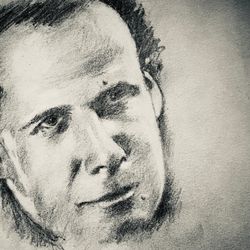
37. DISCOVERING EISENSTEIN: Part 1 - Life and films.
01:00:49||Season 2, Ep. 37This is the first of two episodes on the life, work and collaborations of Soviet film director and theorist Sergei Eisenstein. Ian Christie has researched and written about Eisenstein for more than 40 years. In this wide ranging conversation, we talk about the influence of his troubled childhood, the importance of drawing throughout his life, the international fame that resulted from his second film 'Battleship Potemkin' (made a century ago) and his early theoretical writing on montage. We discuss his 3 year trip abroad, including Hollywood where he became a friend of Chaplin, the profound effect on his thinking and work of an extended trip to Mexico and the criticism he received on his return. His ill-fated and banned sound film 'Behzin Meadow', made at the height of Stalin's Purges, gets an airing before we move on to his last two films based on the life of Ivan the Terrible, the first part of which led to later criticism of him as a Stalin apologist, whilst the second part was banned by Stalin. Another great conversation. Part 2 coming soon...Participants:Ian Christie, Professor of Film and Media History, Birckbeck, University of London. www.ianchristie.orgKen Barrett, visual artist, writer and retired neuropsychiatrist: http://www.kenbarrettstudio.co.ukOksana Bulgakowa’s biography of Eisenstein: https://europe.potemkinpress.com/products/oksana-bulgakowa-sergei-eisenstein-a-biography-1Ian's recent book 'Eisenstein Universe' edited with Julia Vassilieva. https://www.bloomsbury.com/uk/eisenstein-universe-9781350142091/Opening music: Prelude to the opera Brainland, composed by Stephen Brown. Brainland the opera website: www.brainlandtheopera.co.ukPortrait sketch by KB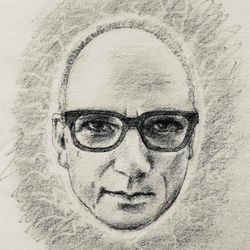
36. AN ARTIFICIAL HISTORY OF NATURAL INTELLIGENCE: Time travelling the mind.
48:53||Season 2, Ep. 36In this episode David Bates discusses his recent book An Artificial History of Natural Intelligence: Thinking with machines from Decartes to the digital age', a masterly survey of the history of intelligence and its aids. The book is the summation of 20 years of scholarship, a kind of time travel of the mind, and the range of topics we cherry-pick include the influence of automata on Descartes's thinking and pocket watches on Kant's, Spinoza's 'bloodworms', Peirce's hypothesis as 'emergency thought', Hughling Jackson on the brain as a continuously evolving organ, the origin of the notion of brain plasticity, Wolfgang' Köher's chimps and Alan Turing's 'spiritual machines'. Lyotard wrote that 'technology wasn't invented by us. Rather the other way round'. Discuss....or just have a listen.Participants:David W. Bates, Professor, Department of Rhetoric, University of California, Berkeley https://vcresearch.berkeley.edu/faculty/david-batesKen Barrett, visual artist, writer and retired neuropsychiatrist: http://www.kenbarrettstudio.co.ukDavid's book: An Artificial History of Natural Intelligence: https://press.uchicago.edu/ucp/books/book/chicago/A/bo212878817.htmlOpening music: Prelude to the opera Brainland, composed by Stephen Brown. Brainland the opera website: www.brainlandtheopera.co.ukPortrait sketch by KB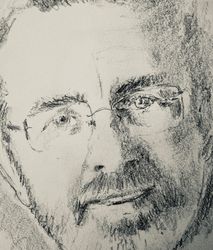
35. WILLIAM SARGANT AND HIS 'SLEEP ROOM': Shrinks, spooks and medical hubris.
59:11||Season 2, Ep. 35In this podcast novelist and journalist Jon Stock discusses his latest book 'The Sleep Room: A very British Medical scandal', is a factual account of psychiatrist William Sargant (1907-88 ) that focusses particularly on Sargant's controversial 20 year 'sleep room' regimen for mental illness that combined continuous narcosis, high dose mixed antidepressants, major tranquillisers and ECT, sometimes extending over several months. We talk about Sargant's early life and the influence of his strict methodist father, who sparked an interest in conversion and, later in brainwashing, a subject that brought him to the attention of intelligence services at the height of the Cold War. We discuss his failure to get into general medicine and his determination to drag psychiatry, where he ended up, into mainstream physical medicine. Sargant's own mental illness episodes get a mention, and his lack of public acknowledgement of same; we outline the atmosphere of deference to senior medics in his period and his friendships in politics and intelligence, fertile ground for untried treatment experiments that also fed into his advice on interrogation techniques and protected him following accusations of sexal improprieties. A really interesting portrait of the man and his times.Participants:Jon Stock, novelist, journalist and historian. : https://williamsargant.com/ jsthrillers.comKen Barrett, visual artist, writer and retired neuropsychiatrist: http://www.kenbarrettstudio.co.ukWillaim Sargant: https://williamsargant.com/index.php/about/Jon's Book 'The Sleep Room': https://williamsargant.com/Opening music: Prelude to the opera Brainland, composed by Stephen Brown. Brainland the opera website: www.brainlandtheopera.co.ukPortrait sketch by KB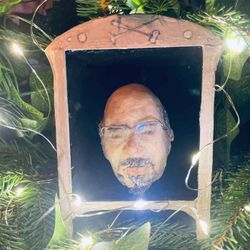
34. MANHANDLING THE BRAIN: How did damaging the brains of the mentally ill ever seem a good idea?
38:29||Season 2, Ep. 34In this festive episode Ken reads 'Manhandling the Brain', his essay on the origins of mid-20th century psychosurgery, an attempt to understand how, for over 20 years, so many people thought it such a good idea to damage the brains of the severely mentally ill and the lessons that can be learned.Participants:Ken Barrett, visual artist, writer and retired neuropsychiatrist: http://www.kenbarrettstudio.co.ukFull text of the essay with bibliography and references are here, preceded by an essay on the early days of the EEG and more: http://www.kenbarrettstudio.co.uk/writing/Bibliography top picks in bold)Moniz E (1935), Tentatives operatoires dans le traitement de certaines psychoses, Masson, Paris.Freeman W, Watts JW & Hunt T (1942) Psychosurgery: Intelligence, emotion and social behavior following prefrontal lobotomy for mental disorders. Springfield, Thomas.Board of Control (1947), Pre-frontal Leucotomy in 1000 Cases, HMSO.Shutts D (1982), Lobotomy: Resort to the Knife, Van Nostrand Reinhold, New York.Rylander G ( 1948), Personality Analysis Before and After Frontal Lobotomy, in The Frontal Lobes , John F Fulton et al Eds., pp691-705. Williams and Wilkins, Baltimore.Vallenstein ES (1986), Great and Desperate Cures: The Rise and Decline of Psychosurgery and Other Radical treatments for Mental Illness, Basic Books Inc..Pressman JD, Last Resort: Psychosurgery and the Limits of Medicine, Cambridge University Press, 1998.El-Hai J (2005), The Lobotomist: A Maverick Medical Genius and His Tragic Quest to Rid the World of Mental Illness, John Wiley & Sons.Howard Dully and Charles Fleming, Messing with my Head: The shocking true story of my lobotomy, Vermilion, 2007.Kotowicz Z (2012), Psychosurgery: the Birth of a New Scientific Paradigm, Centre for Philosophy of Science, University of Lisbon.Raz M (2013), The Lobotomy Letters: The Making of American Psychosurgery , University of Rochester Press.Ferone G & Vincent J-D (2011), Bienvenue en Transhumanie: sur l’homme de demain, Editions Grasset & Fasquelle, Paris.Todes DP (2014), Ivan Pavlov: A Russian Life in Science, Oxford University Press.Papers:Hutton E L (1941), Early Results of Prefrontal Leucotomy, Lancet, July 5, 3-12.Hutton E L (1942), The Investigation of Personality in Patients treated by Prefrontal Leucotomy, Journal of Mental Science, 371, 275-281.Golla F L,(1943), The Range and Technique of Prefrontal Leucotomy, Journal of Mental Science, 89; 189-191.Opening music: Prelude to the opera Brainland, composed by Stephen Brown. For comment or to share your own essay Ken can be contacted at kenb@kenbarrettstudio.co.ukBrainland the opera website: www.brainlandtheopera.co.ukFestive wax model (of Walter Freeman) by KB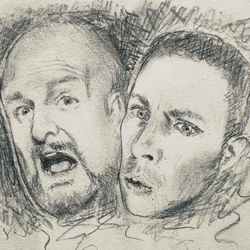
33. THE HORROR! The anatomy of fear in film.
53:01||Season 2, Ep. 33In this episode film critic/writer Matt Glasby and artist Barney Bodoano discuss their innovative book on horror movies 'The Book of Horror: The anatomy of fear in film'. After talking about their gateway into their horror obsession Matt takes us through his seven 'scare tactics', techniques used by film makers to evoke shock, dread, revulsion etc. including specifically filmic techniques such as 'dead space'. Barney talks about how he chose an evocative image to represent each film and his decision to use charcoal and chalk as his medium. Their book scores each of 37 films on each of the 7 parameters, summarises the plot and suggests similar movies. We discuss five films in some detail: Hitchcock's 'Psycho' (1960), the Italian classic 'Suspiria' (1977), Japanese trailblazer 'Ring' (1999), lockdown movie 'Host' (2020) and Matt's highest scoring film 'Hereditary' (2018), with a nod to a number of other movies. Lovely chat and an enjoyable book about a creepy subject.Participants:Matt Glasby writer, critic https://mattglasby.com/index.phpBarney Bodoano, artist and illustrator https://www.instagram.com/bbodoano?igsh=c3B4d3hsNnhrYXk1&utm_source=qrKen Barrett, visual artist, writer and retired neuropsychiatrist: http://www.kenbarrettstudio.co.ukTheir 'Book of Horror: The anatomy of fear in film' : https://www.waterstones.com/book/the-book-of-horror/matt-glasby/barney-bodoano/9781836009399The movies we discuss: https://www.imdb.com/title/tt7784604/?ref_=fn_t_1Dario Argento's 'Suspiria' from 1977: https://www.imdb.com/title/tt0076786/Hideo Nakata's 'Ring' from 1998: https://www.imdb.com/title/tt0178868/?ref_=nm_knf_c_2Rob Savage's 'Host' from 2020: https://www.imdb.com/title/tt12749596/?ref_=nv_sr_srsg_0_tt_8_nm_0_in_0_q_host%25202020Ari Aster's 'Hereditary' from 2018: https://www.imdb.com/title/tt7784604/The band Barney mentions at the end, 'Crumbling Ghost':Opening music: Prelude to the opera Brainland, composed by Stephen Brown. Brainland the opera website: www.brainlandtheopera.co.ukSketch by KB (Barney is on the left)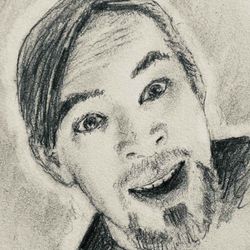
32. HORROR ON THE BRAIN: The neuroscience behind sci fi and horror.
44:27||Season 2, Ep. 32Austin Lim's book 'Horror and the Brain' uses work from the horror and science fiction genres as a way into discussing a neuroscience and a range of related stories. We discuss why on earth so many people inflict the feelings provoked by horror fiction on themselves ans talk about a range of brain structures that play a role in fear, emotion and attachment behaviour (with a diversion into love, oxytocin and prairie voles). We talk about the amygdala, insula and the pathways that include them and the systems triggered by disgust and the uncanny, moving from the real story of a mass shooting to various films and stories, including Jordan Peele's 'Get Out' and 'Us', Gondry's ' Eternal Sunshine of the Spotless Mind' Mary Shelley's 'Frankenstein'. Brain mapper Wilder Penfield leads us into a closing horror story (real if you happen to be a mouse) about Toxoplasmosis. Great chat with an excellent communicator.Participants:Austin Lim, Associate Teaching Professor, Department of Neuroscience, De Paul University, Chicago. https://csh.depaul.edu/faculty-staff/faculty-a-z/Pages/neuroscience/sean-austin-lim.aspxKen Barrett, visual artist, writer and retired neuropsychiatrist: http://www.kenbarrettstudio.co.ukAustin's book 'Horror on the Brain': https://www.simonandschuster.co.uk/books/Horror-on-the-Brain/Austin-Lim/9781493084791The 'uncanny valley': https://www.simonandschuster.co.uk/books/Horror-on-the-Brain/Austin-Lim/9781493084791More on oxytocin: https://www.sciencedirect.com/science/article/pii/S2666497621000813Opening music: Prelude to the opera Brainland, composed by Stephen Brown. Brainland the opera website: www.brainlandtheopera.co.ukSketch by KB.